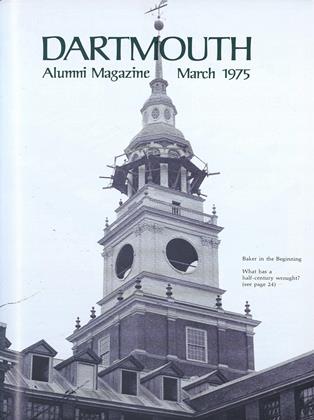In the shadows of Sanborn House, Larry Danson is still remembered as a bright light among the English majors of a dozen years ago. Now, in his first book, he shows that he has kept and polished his early deftness with words. He also shows, by certain airy shifts in his argument, that he has not been daunted by the dragons - though he may have been partly seduced by the will-o'-the wisps - of the Yale Graduate School.
Traditional studies of Shakespearean tragedy usually dismiss as a botched piece of apprentice work the poet's weird early (perhaps earliest) attempt in the form, Titus Andronicus. Danson, up to date in taking this exuberant exercise in blood and horror for his critical point of departure, realizes that in a sense it must have been Shakespeare's creative one in his career as a tragic dramatist. It suggests in rough strokes themes that were to receive subtler, fuller treatment in Julius Caesar, Hamlet, Troilus andCressida, Othello, King Lear, Macbeth, and Coriolanus — to each of which the author devotes a chapter, after giving us an introductory one on Titus itself. His title, too, is inspired by a vow which the Roman hero of Titus makes to his tongueless, handless daughter, Lavinia, a victim — more pitiful, the dialogue insists, than Ovid's Philomela — of rape and mutilation: "Thou shalt not sigh, nor hold thy stumps to heaven,/ . . . nor make a sign,/ But I of these will wrest an alphabet/And by still practice learn to know thy meaning."
It's a good base to build on. It would be pleasant to report that Danson has done so successfully. His absorption in Shakespeare and his wide reading in Shakespearean criticism are manifest. Further, he brings both enthusiasm and keenness to the headily contemporary concern with the self-reflecting aspects of literature - poetry about poetry, plays within plays, words questioning words - which, as both his title and sub-title indicate, is intended to be the distinctive mark of his approach to the inevitably familiar topics afforded by Shakespearean tragedy. Here's where the complication comes. The effective treatment of such a concern requires that the critic see arid discuss his material in double focus without falling into the blur of double talk. This, Danson is not always able to do. He comes closest in his often brilliant essay on Hamlet. Elsewhere "Shakespeare's drama of language" keeps sliding back into the well-charted drama that Shkakespeare presents through language - and silence. We debate once again the genre of Troilus and Cressida, the unity of Julius Caesar, the regeneration of Lear. Meanwhile the phrase "wrest an alphabet" recurs like a slightly lost leitmotiv.
Just the same, Danson's book is full of apercus, style, critical promise. We may confidently expect equally talented but more trenchant and more clearly unified work from him in the future.
TRAGIC ALPHABET: SHAKESPEARE'S DRAMA OF LANGUAGE. By Lawrence Danson '64.Yale University Press, 1974, 200pp. $11.
Mr. Vance taught Shakespeare at DartmouthCollege before he retired as Willard Professor ofOratory and English literature.
 View Full Issue
View Full Issue
More From This Issue
-
 Feature
Feature"He could Have talked Satan into abandoning hell"
March 1975 By MARY BISHOP ROSS -
 Feature
Feature"How Ya Gonna Keep 'Em Down on the Farm?"
March 1975 By ROBERT L. HIER -
 Feature
FeatureAnother Day, Another Dollar
March 1975 By V.F.Z. -
 Feature
FeatureA Renaissance of Slashers and Bashers
March 1975 By SID LEAVITT '62 -
 Article
ArticleOnce forbidden territory to students, The Library(ies)
March 1975 By JAMES L. FARLEY -
 Class Notes
Class Notes1959
March 1975 By DOUGLAS WISE, BARRY R. BLAKE
THOMAS H. VANCE
Books
-
 Books
BooksALUMNI PUBLICATIONS
June, 1922 -
 Books
BooksTHE PROBLEMS OF ADMISSION TO COLLEGE
June 1929 -
 Books
BooksSKI-ING.
MARCH 1932 -
 Books
BooksThe Middle Passage
January 1924 By E. P. CHASE '16 -
 Books
BooksDONOVAN OF O.S.S.
JUNE 1970 By HENRY L. ROBERTS -
 Books
BooksTHE MAKERS OF AMERICA AND THEIR LAND OF PROMISE.
November 1952 By HERBERT F. WEST '22



